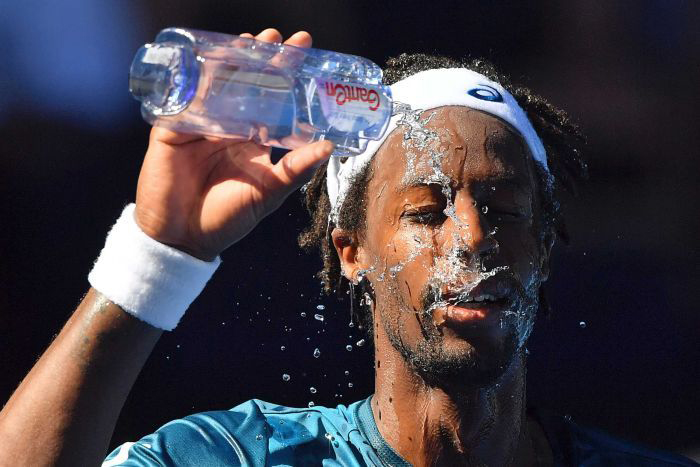Elite sports have many options to deal with climate change not available to most. A Hobart conference looks at how we deal with climate injustice.

Gael Monfils suffered in what he believed to be “risky” heat above 40C in Melbourne. PHOTO Andy Brownbill, AP.
How much heat and humidity should halt tennis matches? When temperatures pass 40C should cricketers take the field, or should bike racing be cancelled?
There’s a question of fairness at play in this. Grizzled players from times past talk of “softness” creeping into the game, as if that’s all that needs to be said. But it isn’t.
Imperceptibly but irresistibly, conditions are changing. The heatwaves of today are stronger than they once were, and today’s young people are being asked to perform in conditions that will soon be pushing against the limits of human health.
Questions about the dangers of active sport in summer heat are becoming common. The death of an athlete from heatstroke in one of our big sporting events would put another kind of heat on event authorities, so they’re putting a lot of money and effort into trying to stop it happening.
I don’t know how this will play out. Cricket and tennis matches are perhaps most manageable in that players can cool off during breaks in play. Endurance events on land, like running and cycling, may eventually have to be moved to cooler seasons, or relocated to Tasmania.
Unlike the elite sports, the world’s poor have no resources to draw on to relieve their discomfort. But they are or will become the real victims of extreme heat and other outcomes of climate change, including drought and flood, crop and fishing failures and rising seas inundating coastal lands.
Ironically, these developments can be sheeted home to greenhouse emissions mainly from activities by wealthier countries and their people, one of the glaring injustices that have been exercising some of the world’s best ethical and legal minds.
The people of Hobart have the opportunity to hear outcomes of such contemplation in a public conference next month titled “Imagining a different future: Overcoming barriers to climate justice”.
When you think about it, questions of justice, or fairness, creep into pretty well everything we are faced with in dealing with human-induced climate change.
Is it fair, for instance, that a whole generation of lawmakers in our parliaments has ignored the imperative to prepare infrastructure, governance and economic resources to deal with the predictable stresses that climate change will impose on future generations?
Is it fair that when, more than ever, we need considered decisions and stable institutions supported explicitly and implicitly by the public at large, key players seem to have decided that anything goes in public life?
Is it fair that the same governments that are putting ever more resources into policing individuals’ behaviour are handing over power to private interests responsible to no-one except their shareholders, while denouncing the “red tape” that allows us to scrutinise and regulate them?
The populism that pervades politics today has brought to the fore questions about the capacity for independent thought among those in authority. We need more than ever politicians and bureaucrats with knowledge and imagination, able to think outside the square.
With an election coming up to decide Tasmania’s government for the next four years, there couldn’t be a better time to bring the best and brightest thinkers about justice and ethics to Hobart to challenge assumptions and pose the questions that politicians and the rest of us need to be asking.
“Imagining” will be looking at the many barriers that stop necessary changes from happening, in government, law, business, economics and energy, and how we utilise science and technology. And beneath all this, the psychology behind our responses to climate change.
Ethical issues affecting disadvantaged countries, divestment, technological interventions and human rights and climate change litigation are all being examined at the conference, which will also involve the work of artists, writers, filmmakers, and musicians engaging with climate change.
Augmenting a large array of Australian thinkers, lawyers, and scientists presenting at the conference will be international luminaries including Marcus Duwell, a leading European ethicist, Catriona McKinnon, a UK specialist in political theory and climate change, and Steve Vanderheiden, an acclaimed US expert on climate ethics and politics.
The University of Tasmania is to be congratulated for giving its strong backing to the conference and community events and for supporting the Law School’s Peter Lawrence and Jan Linehan in their outstanding effort to get it happening.
For funding a community event at the end of the conference led by 2017 Senior Tasmanian of the Year, Margaret Steadman, in which ordinary Tasmanians can have their say, the Hodgman government gets a pat on the back. It would make eminent sense if some in its ranks took part.
“IMAGINING a different future” (8-10 February at the Medical Science Precinct, cnr Liverpool and Campbell Streets) is open to the public. Register at www.climatejustice.network
There are also two free public events. Steve Vanderheiden will speak about climate ethics at 7.30 pm on 8 February at Hobart Town Hall, and a forum at the Medical Science Precinct on 10 February (1-5pm) invites Tasmanians to explore how climate justice might improve our future.
